
Ayodeji is a student of one of the secondary schools in Surulere, Lagos. He is reported to be a member of confraternity, which his parents are not aware of. He is gentle and has a quiet disposition, which attracts people to his side. But he is deadly, even at his young age. He has initiated a lot of unsuspecting children to his cult group.
But Ayodeji is a victim of circumstance. The once brilliant, young boy was forced into cultism by circumstance.
For years now, cultism is no longer restricted to tertiary institutions, as the menace has spread to both primary and secondary schools.
In 2013, 18 children in Abeokuta, Ogun State were arrested for being cult members. In the same year, 11 other students were arrested. The following year, Ondo State Police Command nabbed four secondary school pupils for cultism, while in 2016; police in Delta State apprehended 28 primary and secondary pupils aged between 13 and 16, for cultism.
Similarly, in May 2017, seven pupils from four public secondary schools in Lagos were arrested and arraigned before an Ebute Meta magistrate court. Later in September of the same year, the Special Anti-Robbery Squad (SARS), Ikeja, arraigned 12 pupils of another public Junior Secondary School in Lagos before an Ikeja chief magistrate court, for the scourge.
Within days, the police and Lagos Neighbourhood Safety Corps (LNSC) arrested 17 pupils for cult-related activities. In that year, the Ministry of Education in Bayelsa State expelled seven pupils, found to be cult members, from a community school.
Worried by the evolving trend of cultism in these schools, in 2018, the police in Lagos appealed to the state government to declare a state of emergency on cultism in its primary and secondary schools.
In May 2019, 12 elementary and secondary school pupils of a public school in Lagos were caught being initiated into the AWAWA confraternity group.
The menace, over the years, has eaten deep into the system, as more schoolchildren are daily initiated into different cult groups.
These groups, including girls, terrorise their neigbourhoods and unleash mayhem in schools, as they engage in supremacy battle, disrupting the fragile peace in the land.
Expressing worry over the trend, Chairman, Nigeria Union of Teachers (NUT), Lagos State chapter, Adedoyin Adesina, said cultism in Nigeria has eaten deep into the fabric of the society.
Adesina expressed regrets that the menace is no longer restricted to tertiary institutions, as it has permeated both secondary and primary schools in the country.
“In most of our secondary and primary schools today, we have seen pupils and students with incisions and other signs on their bodies to prove their membership of one society or the other,” he said.
The NUT chief attributed the development to bad associations, ego, lack of parental monitoring, societal problems and imitating parents who are cultists, among others.
Lagos State Chairman, Academic Staff Union of Secondary Schools (ASUSS), Kazeem Labaika, lamented that the home, which is meant to take charge of the upbringing of the child, is being neglected, which has resulted in loss of values.
He also blamed the development on moral decadence in the society. Labaika said it is unfortunate that cultism has spread to primary and secondary schools.
He said cultism was synonymous with higher institutions of learning, but things have changed as teenagers have been drafted into the fold.
Labaika said: “The role of parents cannot be over emphasised in the upbringing of a child and if that aspect is neglected, it will affect everything because home is an integral part of the society.
“We don’t encourage hard work again but always lay emphasis on how we can make it through crooked means. In the olden days, if a child did something wrong everyone around him or her will rebuke the child. But today, parents don’t even censor the type of friends their wards keep. We don’t look at what they do at home when we are around or listen to feedback from neighbours. What most parents are after is money, forgetting that parenting is much more than money. No more home training, moral teachings and words of encouragement, even at home, these children do not even respect their parents.
“I could remember a case I handled years back. We noticed that some of our students were engaged in secret meetings where they initiated new members. When we commenced investigation, we found out that there were students from other schools who were members of a secret cult,” Labaika stated.
Education consultant, Julius Opara, said fraternities in universities began as far back as 1952. “In those days, members had the sole aim of maintaining law and order. However, these days, cultism has moved from tertiary institutions to neighbourhoods, streets, primary and secondary schools.
“On campuses, in those days, students joined for various reasons such as protection, power, sense of belonging and peer pressure among others. As interesting as those reason sounds, they were mainly temporary fulfillments, which at the long run, leaves the individual with numerous personal consequences such as expulsion, injuries from cult clashes, destruction of property, loss of life or initiation that automatically transforms the individual who used to be a person of good character to become ruthless,” he said.
Speaking further, he said: “Recall that the very first reported case of cultism in secondary school was in 2003. One would have thought that government would have put measures in place to curb the spread. A few of us in the education sector might remember the case of cultism in one primary school in Lagos State, which was discovered by men of Lagos state Neighbourhood Security Corps (LNSC), who handed over the case to the Nigeria Police Force, Igando Division. A young teenager from Egan Secondary School had confessed to initiating about 10 primary school pupils who got busted by LNSC during one of their cult meetings.”
Opara attributed the spread of the menace to poor parental control, poor upbringing, lack of care, poverty, decay in moral standards, poor education, drug abuse, broken family and peer pressure. He said these factors are pointers to the general problems confronting the society.
An author, Ebi Benjamin, rued the spreading influence of cultism in schools. He said at this critical time when the nation is facing huge security challenges, nobody can deny the fact that cultism as a social menace is inextricably linked with acts of violence and crime, especially in the southern part of the country.
According to him, cultism has always been a fertile breeding ground for armed robbery, kidnapping, political thuggery, drug addiction, militancy and other related crimes.
He said, “Many young people, especially of the male gender, now find themselves trapped in this social malaise without knowing how to liberate themselves. There are a number of reasons why cultism has eaten so deep into the psyche and lifestyle of many Nigerian youths – breakdown of the family system, poor state of education, abuse of drugs, peer pressure and so on.
“The most crucial of all these factors is breakdown of family unit. Charity, they say, begins at home, which is the most fundamental unit of any society. When the family gets it wrong, society feels the negative impact.
“Many parents hardly spend quality time with their kids or even place high value on moral development, the result is exposure of these children to horrible influences outside the home.”
To address the trend, the NUT chairman urged parents to give thorough monitoring and supervision to their wards.
He also advised government at various levels to engage in aggressive campaign on the consequences of cultism. He said all school counsellors should do more on enlightenment and counselling on effects of cultism, while calling for stringent measures and penalty to checkmate those involved in the larger society.
Adesina enjoined parents who are members of cult groups to rescind their membership and keep it away from their wards.
He said all hands must be on deck to fight the menace while government and citizens should cooperate to address the challenge.
Labaika said the society must inculcate moral values in the life of every child to checkmate the menace of cultism.
On his part, Opara said all stakeholders must begin to make concerted efforts to eradicate cultism from schools.
He said: “Parents must begin to inculcate right moral values and showcase such values each day for children to emulate. They must provide basic needs and prevent their wards from being lured into secret cults. They should endeavour to constantly encourage their children to read the holy books and visit religious houses of their choice frequently to learn values that would help them make good decisions when faced with such challenges.”
Besides, he stated that government at all levels must ensure adequate funding of the sector by providing facilities that would improve learning, while the curriculum should include subjects that teach morals, security, personal development and self awareness.
“Our law enforcement agencies should avoid double standards, be upright and avoid perversion of justice. They must ensure adequate punishment for offenders to serve as deterrent to others. School administrators should avoid cutting corners, employ seasoned and qualified guidance and counsellors who are experienced and know how to create an enabling environment for dialogue.
“Lastly, school teachers should be extremely vigilant to notice and report swift change in attitudes of students, which may be a pointer to something abnormal happening.
Benjamin stated that solution to cultism in Nigeria is a return to family values, like mutual respect, compassion, integrity and contentment.
“Beginning from primary education, the rudiments of being a good and responsible citizen should be imparted in the children, Benjamin said.













